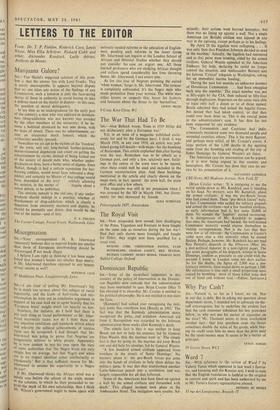Dominican Republic
Sta,—Some of the staunchest supporters in this country of the policy of intervention in the Domini- can Republic now concede that the administration may have overstated its case. Brian Crozier (May 7) has elevated it to absurdity. Mr. Crozier is entitled to his political philosophy. He is not entitled to mis-state the facts.
'[Kennedy] had sulked over recognising the mili- tary junta that overthrew him [Bosch] in 1963: The fact was that the Kennedy administration never recognised the junta, and withdrew American aid from it. Recognition was accorded by the Johnson administration three weeks after Kennedy's death.
'The simple fact is that it was neither to keep Bosch out nor to help his enemies, led by General Elias Wessin, that the marines went in.' The simple fact is that by going in. the marines did keep Bosch out and did help his enemies, led by General Wessin.
'A few hundred armed civilians appeared from nowhere in the streets of Santo Domingo.' No mystery about it: the pro-Bosch forces put arms into the hands of civilians to help them defeat the military junta. It was this that transformed another Latin-American putsch into a revolution, and was largely responsible for all that followed.
'Some of the Americans had been lined up against a wall by the armed civilians and threatened with death.' This alleged incident took place at the Ambassador Hotel. The instigators were youths. Ad-, mittedly, their actions went beyond horseplay, but there was no lining up against a wall. Not a single American (or British) civilian was injured in any way in the uprising, except perhaps as to his feelings.
'By April 28 the legalists were collapsing. . . . It was only then that President Johnson decided to send in the marines.' Actually, the legalists had recovered and at that point were winning, aided by the armed civilians. General Wessin appealed to the American Embassy for help, declaring he could no longer control the situation, and Ambassador Bennett sent his, famous 'Critical' telegram to Washington, asking for an immediate marine landing.
'During the past few months an unknown number of Dominican Communists . . . had been smuggled back into the republic.' The exact number was put at fifty-eight by the CIA, then reduced to fifty-four through duplication. Reporters on the scene were able to trace only half a dozen or so of those named. Bosch admitted they had joined the legalist forces, but denied they had taken control, or that they could ever have done so. This is the crucial point in the administration's case. It has thus far not been supported by any evidence.
'The Communists and Castristas had indis- criminately murdered some two thousand people and wounded countless others.' This is the most flagrant, and perhaps most wilful, of Mr. Crozier's errors. A large portion of the 1,100 deaths in the uprising came from the bombing and strafing of the city of Santo Domingo by General Wessin's air force.
The American case for intervention can be argued, as it is now being argued in this country and hemisphere. Mr. Crozier has done that case no ser- vice by his presentation of it.
CBS News, 485 Madison Avenue, New York 22
[Brian Crozier writes: 'It is intriguing to see the world upside-down as Mr. Kendrick sees it standing _ on his head. No mystery, says Mr. Kendrick. about the armed civilians: it was the pro-Bosch forces who had armed them. These "pro-Bosch forces" were, in fact, Communists who raided the military arsenals and armed the civilians—not a few hundred civilians, as early information had it, but some 20,000 of them. No wonder the "legalists" started recovering. It is disingenuous of Mr. Kendrick to suppose that once the Americans had landed, the well-trained Communist minority would expose themselves to visiting correspondents. Nor is the fact that they were few at all relevant : the Communists in Castro's camp were also a tiny minority when he ousted Batista. Perhaps, however, Mr. Kendrick has not read Roy Perron's dispatch in the Observer (May 16), a non-political reporter in a non-rightist paper. The last seven paragraphs of his dispatch, written in Santo Domingo, confirm as precisely as one could wish the account I wrote in London some ten days earlier. As for the deaths, the figure of 2.000 was a pre- liminary estimate, since scaled down to perhaps 1,500. My information is that only a small proportion were caused by bombing: most of those killed were shot out of hand and without trial.'—Editor, Spectator.]


































 Previous page
Previous page